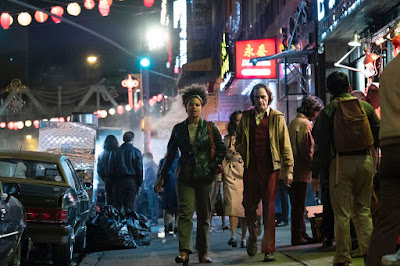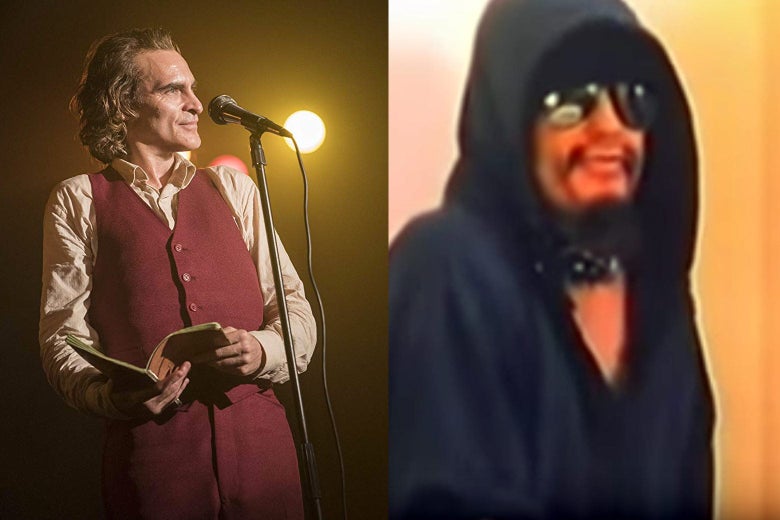Saturday, October 05, 2019
http://copycateffect.blogspot.com/2019/ ... Joker.html

FLASHBACK:
How 'The Hangover' director Todd Phillips took on the military industrial complex
viewtopic.php?f=8&t=39959
The Key to Understanding Joker Is the Movie Todd Phillips Made 26 Years Ago
Sam Adams/Oct 3, 2019
Joaquin Phoenix in Joker and GG Allin in Hated: GG Allin & the Murder Junkies. Photo illustration by Slate. Photos by Warner Bros. and Skinny Nervous Guy Prod.
“GG Allin is an entertainer with a message to a sick society” begins the epigraph to Todd Phillips’ 1993 documentary, Hated: GG Allin & the Murder Junkies. “He makes us look at it for what we really are. … Make no mistake about it, behind what he does is a brain.” The kicker is the revelation of the quotation’s author, imprisoned serial killer John Wayne Gacy. But watching the movie now, what’s striking about the quote is less its origin than how snugly it fits the movie Phillips has made 26 years later: Joker.
Before Old School and the Hangover movies made him one of Hollywood’s most bankable comedy directors, Phillips was a maker of low-budget documentaries, the first of which focused on Kevin Michael “GG” Allin, a punk singer better known for his repulsive and violent onstage behavior than his music. Described by the Trouser Press Record Guide as a “self-immolating jockstrap-clad mace-spraying dung-flinging aberration,” Allin wrote songs with titles like “You Hate Me and I Hate You” and “I’ll Slice Your Fucking Throat,” but it wasn’t his lyrics, which are also strewn with misogynist language and racial slurs, that got him noticed by the mainstream media. He became famous, and earned invites to daytime talk shows like Geraldo and The Jerry Springer Show, for using the stage as a toilet and covering his body with the results, for cutting his body with glass during shows, and, in one instance, smashing himself in the face with a microphone so hard that he broke six of his own teeth.
It’s that behavior that drew Phillips to him, as you can tell by the movie’s opening voice-over, in which Phillips recalls his first Allin show, where the singer was too high on heroin to perform or even stand, but fans “got their money’s worth” by kicking him and breaking bottles over his head. There’s almost no mention of his music: Though Hated features numerous scenes of Allin onstage, the movie is nearly over before we see him actually perform a song. What we see instead is Allin cutting his bare chest with a razor during a spoken word performance and Allin challenging a female heckler to take the mic, then grabbing her by the hair and throwing her to the ground when she does. We see him naked onstage at New York University—a performance Phillips, then a student, helped arrange—challenging the audience to throw their clothes at him, then wading into the rapidly receding crowd when they don’t. In some cases, the footage appears to be from amateur sources (tapes of Allin’s shows circulated freely as VHS bootlegs), but at least in the case of the NYU show, it seems as if Phillips arranged a performance that he knew, and probably hoped, would turn confrontational, knowing that physical violence was a distinct possibility.
Like Phillips’ narration, the filmmaking in Hated is flat, almost affectless, pushing past ambiguity into moral vacancy. Although Phillips takes a trip to visit Allin’s teachers and childhood friends in small-town New Hampshire, he doesn’t seem particularly interested in, or capable of, getting beneath his shit-smeared surface. When Allin says that if it wasn’t for the outlet that live performance gives him, he’d “probably be a mass murderer,” are we meant to take it at face value, feel relief, think it’s badass? The threat of harm, both to himself and others, is a constant: He vows to commit suicide onstage and says at one point, “My mind is a machine gun, my body’s the bullets, and the audience is the target.” But you don’t get the sense that Phillips cares, as long as he’s getting the good stuff on camera.
Hated is more intriguing when it turns to Allin’s fans—which is to say the subculture that enables his existence. One recounts how he talked his girlfriend into urinating on Allin’s face as a birthday present, while another, identified as “Unk,” admiringly says, “I’d never go onstage and take a dump and throw it at people, but GG’s doing it. … He’s doing something that a lot of people wish they had the fucking balls to do.” (The former anecdote is the occasion for the movie’s most nakedly dickish moment: The man who’s telling it realizes he’s used the woman’s real name and, mortified, asks if he can start again and keep her anonymous; Phillips agrees, and then puts both versions in the film.) The fascination with belligerent outcasts and their followers is an undercurrent that runs through his following documentary, Frat House, which is about fraternity hazing, and all the way up to Joker, in which Joaquin Phoenix’s Arthur Fleck becomes the inadvertent catalyst for an uprising of the downtrodden. Phillips could be talking about them when he says of Allin’s fans that they “represent a part of America that most people would rather not think about, an alienated, directionless minority that appears to have found its voice in a punk rocker with a death wish.”
Phillips himself seems to see the connection. He mentioned Hated while he was introducing Joker at the Toronto International Film Festival. But watching the two together reveals how little his insights have evolved in the intervening 26 years. Joker looks a hell of a lot better than Hated, and Phoenix is a fantastically creepy and compelling central presence. But Phillips hasn’t got free of his juvenile fascination with taboo-breaking. Hated ends with Allin’s funeral after a fatal heroin overdose, and rather than express sorrow at Allin’s death, Phillips mourns that he went out in such a hackneyed rock star manner. “Personally,” Phillips says, “I always hoped he would go out in a more glorious fashion: onstage suicide, five dead fans—something rock ’n’ roll could never ignore.” That sentiment gibes dangerously with both Joker itself and the people who have used the occasion of its release to threaten public displays of violence. Todd Phillips once thought murder-suicide was a joke. Now he’s made a movie about a man who laughs at it.
https://slate.com/culture/2019/10/joker ... ntary.html


